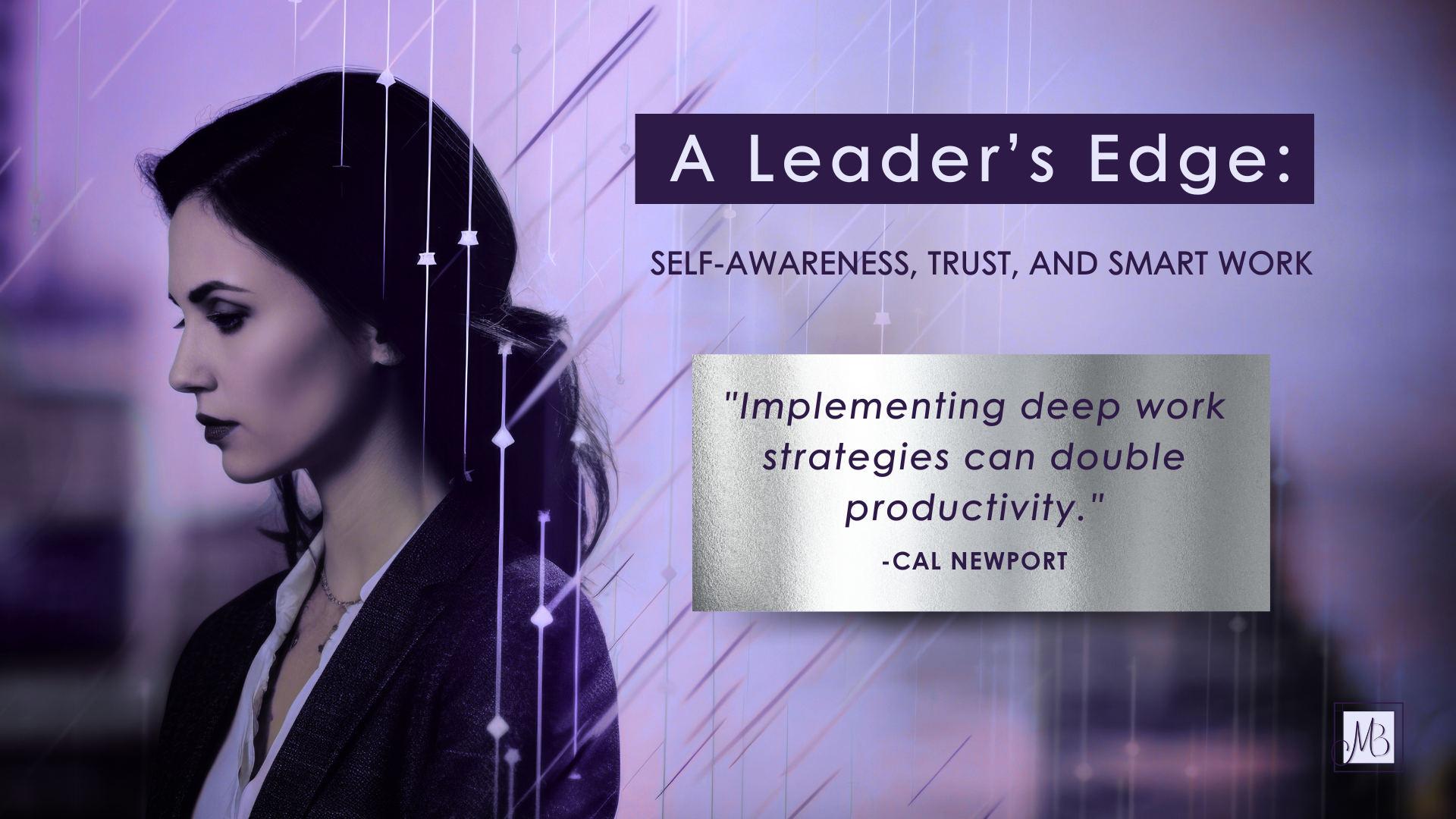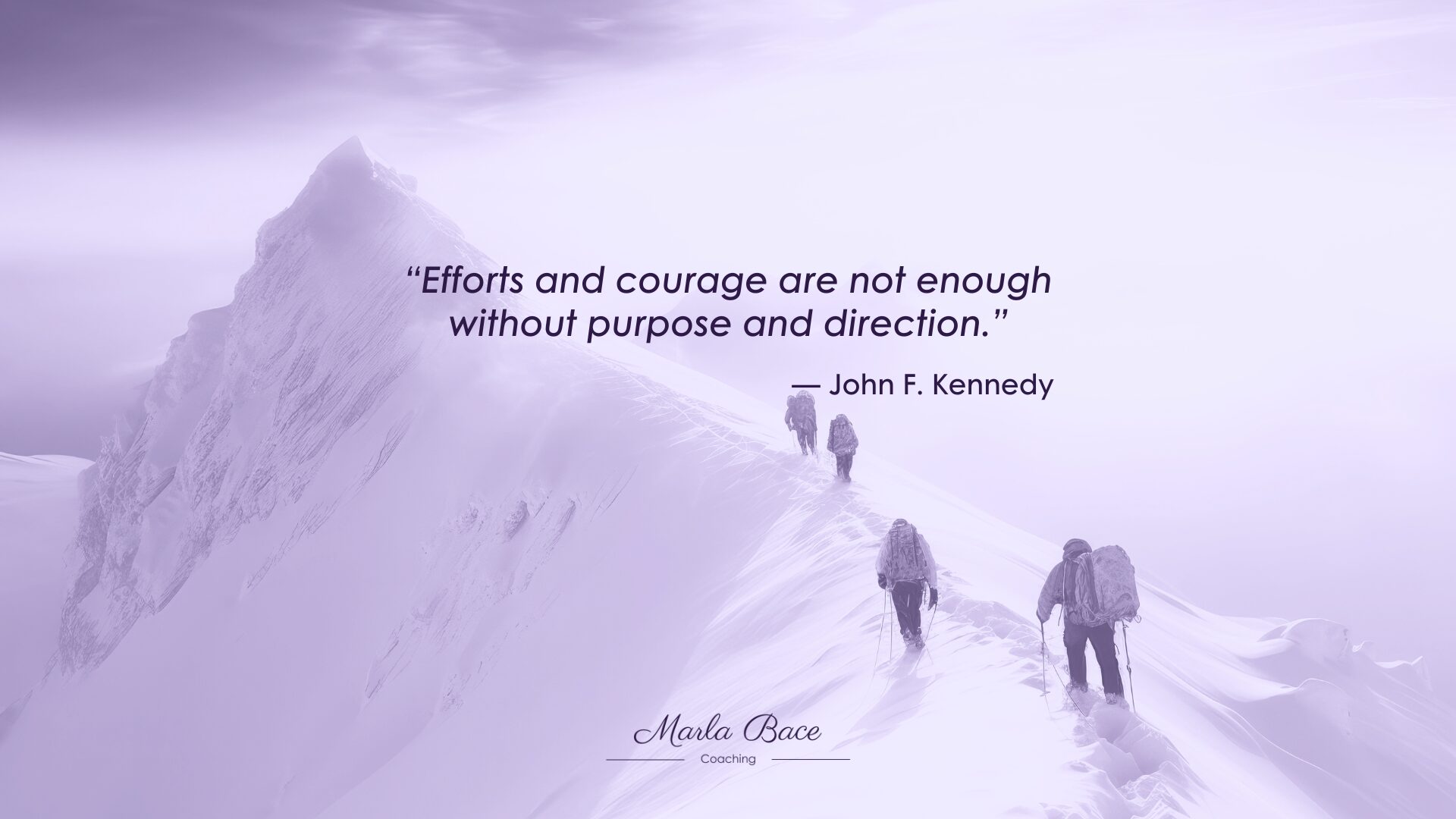Introduction: The Myth of More and the Power of Self-Awareness
Our business world often glorifies the ‘more’ approach to success- working harder, longer hours, and pushing through exhaustion. However, a recent LinkedIn post about Peter Drucker’s famous quote, “Culture eats strategy for breakfast,” Served as a powerful reminder. No matter how robust your strategy is, leadership effectiveness ultimately hinges on trust, transparency, and working smarter. All of these are rooted in self-awareness.
Self-awareness is the bedrock of leadership, igniting engagement, nurturing trust, and empowering leaders to work smarter, not just harder. As Dan Sullivan articulates in 10x Is Easier Than 2x, true growth doesn’t stem from doing more but from concentrating on the right things. This realization is not just enlightening, it’s empowering.
How many leaders consciously focus on their 20%, delegating or eliminating aspects of the 80% that keep them stuck in a reactive, tactical mindset? The truth is, it’s a rare occurrence. Too often, leaders find themselves trapped in the daily grind, not due to a lack of ambition, but because breaking free requires a significant shift in perspective. The paradox is that achieving more starts with doing less of what isn’t essential. Yet, that first step—reevaluating priorities and letting go of tasks that provide a false sense of productivity—feels uncomfortable. It forces leaders to confront inefficiencies, question long-held assumptions, and build systems prioritizing strategy over busyness. But real growth doesn’t happen in comfort; it occurs in challenges.
A shift to innovative, strategic leadership starts with self-awareness.
Leadership Success Starts with Self-Awareness
Leaders who lack self-awareness often fall into the same traps—micromanaging, setting unclear expectations, and struggling to build trust. Without intentional reflection, they miss critical opportunities to refine their approach, improve decision-making, and strengthen relationships with their teams.
Dan Sullivan’s 10x principle highlights that real breakthroughs come from identifying high-leverage activities (or the 20%) rather than doubling down on effort. Self-aware leaders understand this intuitively; this is where emotional intelligence comes into the equation. Instead of trying to control everything, they operate in their ‘zone of genius’ and empower their teams to do the same.
This necessitates a fundamental shift in mindset from focusing on what’s lacking (the gap) to recognizing and leveraging existing strengths (the gain). It also requires a willingness to delegate, not as an act of relinquishing control, but as a strategic move to maximize impact. As Sullivan emphasizes in Who Not How, effective leaders don’t just ask, “How can I do this?” but instead, “Who can do this better?” This shift in perspective brings a sense of relief and confidence.
By acknowledging when they are the bottleneck, self-aware leaders create space for growth for themselves and their teams.
Transparency and Trust—The Cornerstones of Effective Leadership
The first step in creating space for growth is through trust building. Trust isn’t built through words—it’s built through consistent actions. Transparency isn’t a corporate buzzword; it’s the foundation of leadership credibility. As Drucker noted, culture, not strategy, ultimately determines success.
Self-aware leaders cultivate trust because they align their actions with their values. They don’t just pretend to prioritize their teams; they show it through their behavior. Aligning words with actions builds trust. When leaders make empty promises or set expectations they don’t uphold, they erode trust and impact morale.
Self-awareness helps with difficult conversations. While avoiding conflict may feel easier in the short term, it weakens trust over time. Direct, honest communication strengthens relationships. They are also willing to admit mistakes. Owning up to errors builds respect and encourages accountability at all levels.
Contrast this with leaders who lack self-awareness. They may frequently shift priorities, dismiss feedback, or fail to recognize their team’s contributions—behaviors that slowly chip away at trust.
Consider this scenario: A leader frequently cancels one-on-one meetings with their direct reports but insists that “people are our top priority.” While they may believe this statement, their actions contradict it. Over time, employees disengage, sensing that their development is not truly valued. Trust declines, and performance suffers—not because of a lack of talent but because of a failure in leadership.
Self-awareness is the difference between saying you value trust and actually building it.
Smart Work Over Hard Work—Why More Isn’t Always Better
The hustle culture myth suggests that working longer hours leads to better results. But research and real-world experience tell a different story. Cal Newport’s work on Deep Work demonstrates that our capacity for high-concentration tasks is limited to roughly four hours per day. Beyond that, effectiveness diminishes, and mistakes increase.
Simon Sinek’s Sharpening the Saw analogy illustrates this well. Two lumberjacks compete to cut the most wood. One saws nonstop, while the other periodically pauses to sharpen their saw. The result? The second lumberjack outperforms the first because he maintains his tool’s efficiency. In leadership, your mind is the saw, and self-aware leaders recognize when to step back, recharge, and optimize their effectiveness rather than grinding through diminishing returns.
Sustainable productivity isn’t just about working in focused, high-impact intervals; it’s also about leveraging the right people to maximize your results. High-performing leaders understand that their greatest impact comes not from doing everything themselves but from identifying who can take on key tasks, freeing them to focus on their highest-value contributions. Delegation isn’t a sign of weakness—it’s a strategic move that empowers both leaders and their teams.
Leaders cultivate an environment where trust, ownership, and accountability thrive by mentoring and developing others. Effective delegation doesn’t just offload work—it builds leadership capacity at every level, ensuring that critical thinking and problem-solving skills are distributed across the organization. When leaders invest in mentorship, they create a team that can operate independently, reducing bottlenecks and enabling them to focus on their 20%—the high-leverage activities that drive real growth.
True leadership isn’t about how many hours you put in but how effectively you allocate your time, energy, and expertise. Those who master this balance don’t just sustain success—they thrive.
How Self-Aware Leaders Build High-Performing Teams
Building on Dan Sullivan’s “who your who,” great leadership isn’t about control but clarity and empowerment. Self-aware leaders don’t micromanage, ignore team feedback, or overlook contributions. Instead, they recognize the power of building a strong team, identifying who they can mentor into new roles and responsibilities to free up their time—or whom they need to hire to achieve strategic goals.
Consider a leader faced with a growing workload. They have two options: continue handling every detail themselves, inevitably burning out, or take a step back and assess who within their team is ready for more responsibility. A self-aware leader chooses the latter. They invest in developing a high-potential employee, providing mentorship and opportunities to lead initiatives. Over time, that employee grows into the role and strengthens the overall team, reducing dependence on the leader for every decision.
Leadership Landmines to Avoid:
Leaders who lack self-awareness often fall into common traps that stifle team performance and engagement:
- Shifting expectations without clear communication. When leaders constantly change goals or move the goalposts, it creates frustration and uncertainty.
- Micromanaging instead of empowering. Trusting your team to execute drives far better results than controlling every detail.
- Ignoring feedback. Asking for input without acting on it erodes credibility and discourages open communication.
- Failing to recognize contributions. People don’t just work for a paycheck—they want to feel valued and know their efforts matter.
Conversely, self-aware leaders understand trust, recognition, and transparent communication fuel engagement and long-term success. They foster an environment where employees feel empowered to take ownership and confident that their contributions are seen and appreciated.
What Effective Leaders Do Instead:
- They are radically transparent, even when delivering difficult news.
- They encourage open feedback—and, more importantly, act on it.
- They recognize effort, not just outcomes, knowing that progress often matters more than perfection.
- They lead by example, never asking their team to do something they wouldn’t do themselves.
The result? A high-performing team operates with autonomy, trust, and shared purpose, allowing the leader to focus on high-impact work instead of getting buried in the details.
Conclusion: The Self-Aware Leader’s Advantage
Each of these leadership masters—Peter Drucker, Dan Sullivan, Simon Sinek, and Cal Newport—offers valuable insights on improving leadership, working smarter, and building trust. Their strategies provide a roadmap for sustainable success. However, before implementing any of them, one critical question remains:
Where are you starting from?
Self-awareness is the foundation of effective leadership. It’s what allows you to assess where you want to go and who will help you get there. Do you have the right people in place to support your vision? Are you focusing on high-impact work, or are you stuck in the weeds? More importantly, have you taken the time to check in with yourself and those around you?
True leadership growth starts with reflection. Ask yourself:
- What are my blind spots, and am I open to feedback?
- Do my actions align with my leadership values?
- Who is my who—the people I need to mentor, delegate to, or hire to help me reach my goals?
You don’t need all the answers today, but you do need to start asking the right questions. If you’re unsure where you stand, seek input from those you trust—or take the Self-Awareness Quiz to gain a clearer picture.
At the end of the day, leadership isn’t about perfection; it’s about progress. Trust your gut, define the leader you want to be, and take intentional steps toward that vision—because no matter what, the only way forward is through self-awareness.









